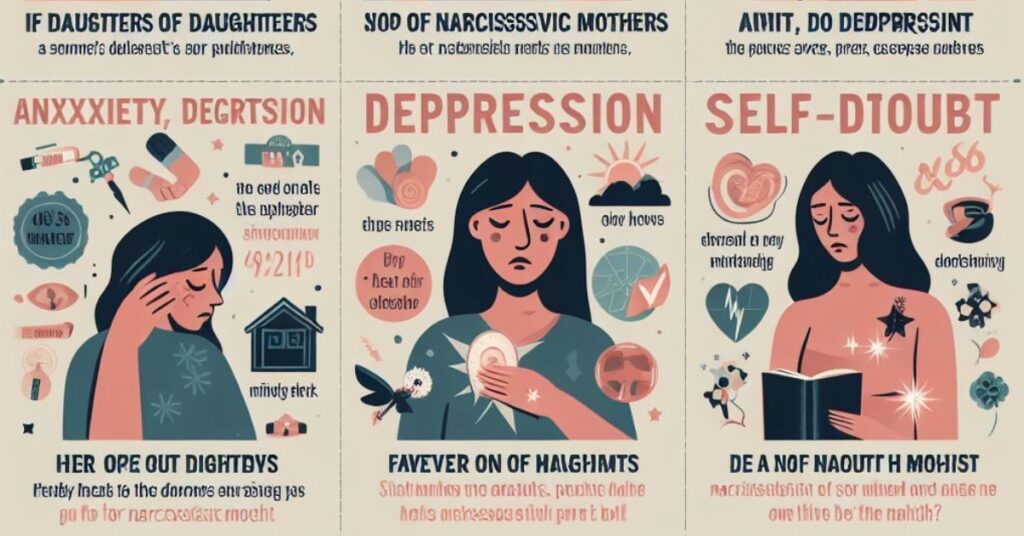10 symptoms of Daughters of Narcissistic Mothers They may have significant emotional and behavioral changes as a result of their mother’s influence. It is important to recognize the signs and symptoms associated with this mobility to open the door to further understanding and treatment.
If a narcissistic mother raised you, you may have gone through many symptoms that have an impact on your health and mental health. A narcissistic mother’s lack of empathy and self-centeredness can negatively impact her daughter in many ways.

10 Symptoms of Daughters of Narcissistic Mothers
Low self-esteem, trouble setting boundaries, persistent self-blame, people-pleasing behavior, fear of abandonment, difficulties with intimacy and trust, anxiety and depression, unrealistic self-expectations, depersonalization, and emotional regulation issues in daughters of narcissistic mothers. There are some common symptoms experienced by them.
Daughters with narcissistic mothers often experience low self-esteem because they are led to believe that they are inferior and unimportant.
They may have difficulty saying no and setting boundaries, resulting in constant self-blame and a tendency to be people-pleasers.
Since daughters of narcissistic mothers have learned to suppress their needs and feelings to prevent rejection or abandonment, fear of abandonment and struggles with intimacy and trust are also important.
You can increase your self-esteem, learn to set appropriate boundaries, and have more satisfying relationships with the help of therapy and support.
Daughters who often face special emotional challenges may find it difficult to live under the influence of a narcissistic mother. Acknowledging and solving these problems starts with understanding the symptoms.
So let us know about the 10 symptoms of daughters of narcissistic mothers.
1. Low self-esteem

Having a narcissistic mother in childhood can lead to low self-esteem. You may constantly compare yourself to other people and feel like you’re never good enough. Your mother constantly scolds you, making you feel inferior and self-conscious.
Children of narcissistic mothers may experience self-doubt and feelings of worthlessness as a result of these mothers’ tendency to impose their concerns on them. If you were raised to believe that you have to be innocent to be loved, this can be hard to bear.
It’s important to note that your mother’s actions do not define who you are as a person. His behavior and his feelings are not your concern. It’s acceptable to prioritize your well-being and set boundaries.
If you suffer from poor self-esteem, there are some steps you can take to increase your sense of worth. Hang out with upbeat, encouraging people who help you move forward. Take care of yourself and do things that give you positive self-esteem. No matter what your mother says to you, never forget that you deserve respect and affection.
2. Having trouble setting boundaries

Daughters raised with narcissistic mothers may have difficulty setting appropriate boundaries in their relationships. Because they often lack empathy and need control, narcissistic mothers may ignore their daughters’ needs and feelings.
Daughters of narcissistic mothers may find it difficult to set boundaries and say no to other people. Because children have been trained to put their mother’s demands before their own, they may feel bad about setting limits. The daughters of narcissistic mothers must learn to set boundaries to protect their emotional health. This may include identifying and expressing your desires and values to others, as well as using assertiveness when needed.
Daughters of narcissistic mothers may find it beneficial to seek therapy or counseling to process the effects of their parenting and create creative coping strategies. Setting boundaries can be challenging, but with time and work, it is possible to build satisfying relationships based on respect and understanding.
3. Extended self-accusation

Daughters of narcissistic mothers often experience long-term self-blame-related problems. This is a result of the criticism and disrespect that children often receive from their mothers, making them feel inadequate. As a result, these daughters are made to believe that they are to blame for any problems and that they are the source of their mother’s happiness and well-being.
This constant self-blame can cause serious damage to a daughter’s self-esteem and mental health. He may develop an unhealthy amount of self-criticism and constant self-blame for things that are not his fault. This can result in depressive and anxious feelings, as well as feelings of guilt, shame, and worthlessness.
Guilt is a common strategy that narcissistic mothers use to manipulate their daughters. They may make their girls feel bad about not being innocent or not doing enough for them. This can lead to a vicious cycle of persistent self-blame, leading the daughter to believe that she can never do enough to win her mother over.
If you are the daughter of a narcissistic mother, understand that constant self-blame is not your fault. It is not a reflection of your value as a person; rather, it is a result of the way your mother treated you. It is important to develop a sense of self-worth and learn to identify instances of excessive self-criticism.
Remind yourself that you deserve respect and affection and that you have no control over your mother’s happiness. You can learn to embrace who you are and, with time and effort, overcome the consequences of your mother’s narcissistic personality disorder.
4. Adorable activities in public
If your mother was narcissistic, you may have developed people-pleasing habits to cope. You may think that you have to do what your mother tells you and follow her principles to gain her approval. Even if their feelings are unfair or hurtful to you, this behavior may make you feel pressured to live up to them.
You may be neglecting your health because you have become accustomed to giving priority to your mother’s wishes and demands over your own. This may cause you to feel angry or resentful about not being able to set firm boundaries with both your mother and yourself.
If you find it difficult to stop trying to please other people, you may want to think about going to therapy to learn assertiveness techniques and healthy coping processes. Remind yourself that you are worthy of respect and love and that it is acceptable to put your wishes and feelings first.
5. Fear of abandonment
Having a narcissistic mother as a child can have a significant impact on your attachment style and may make you fear abandonment. It’s common for narcissistic moms to provide care and attention inconsistently, which may leave you wondering where you fit in. This ambiguity can lead to fear of rejection or abandonment.
Because of this, you may constantly turn to other people for validation and reassurance, even when it’s not needed. You may start to trust other people too much because you feel like they will abandon you if you don’t live up to their standards.
Having an insecure attachment style can make it difficult for you to have good relationships. Excessive possessiveness or clinginess is possible, which will push people away and increase your fear of being abandoned.
Understanding that your fear of being abandoned is unfounded is important. This stems from your childhood and how your mother raised you. You can try to overcome your fear of abandonment and develop a more positive attachment style with the help of a therapist.
6. Fight for closeness and trust
Daughters with narcissistic mothers often experience difficulties with trust and intimacy. Being emotionally abused, emotionally narcissistic, and raised by a narcissistic mother can leave lasting emotional scars that make it difficult to form good relationships.
The most common problem is difficulty trusting other people. It is difficult for daughters with narcissistic mothers to trust people because these mothers often manipulate and lie to get what they want. As a result, you may have difficulty forming meaningful relationships, and you are constantly suspicious of the intentions of others.
It can also be difficult to form healthy love relationships as a result of these trust concerns. You may have trouble sharing your feelings with others and may be afraid of appearing vulnerable. As a result, you may begin to attract emotionally abusive partners, developing the habit of destructive relationships.
Daughters of narcissistic mothers may sometimes experience personality problems such as avoidant or borderline personality disorder. These conditions can make it more difficult to establish healthy relationships because they can make problems with intimacy and trust worse.
In general, daughters with narcissistic mothers often struggle with intimacy and trust.
Therapy is a must if you want to resolve these problems and develop positive interpersonal skills. It is possible to heal the emotional wounds caused by a narcissistic mother and build healthy, satisfying relationships with time and effort.
7. Anxiety and Depression

Growing up with a narcissistic mother can have a significant effect on one’s mental health. You can experience anxiety and depression as a result of your emotional upheaval. Narcissistic mothers’ daughters frequently grow up in a strict environment where they are constantly on guard. Chronic tension and anxiety can arise from this, and they can manifest physically as headaches, stomachaches, and exhaustion.
Daughters of narcissistic mothers may develop depression in addition to anxiety. This is because narcissistic mothers often have high expectations for their daughters but don’t provide them with the encouraging direction they need to succeed. This discrepancy can exacerbate depression symptoms by fostering thoughts of inadequacy and low self-worth.
It is important to realize that daughters of narcissistic mothers often experience anxiety and hopelessness. If you experience any of these symptoms, you ought to speak with a qualified mental health specialist. They can assist you with creating coping strategies and emotional processing procedures that will help you control your anxiety and despair.
Remember that this is not something that only you are experiencing. You can recover from the psychological damage caused by a narcissistic mother and have a happy life if you have the right resources and assistance.
8. Impractical Expectations of Oneself
If your mother was a narcissist, you might have had inflated expectations of yourself as a child. Your mother may put pressure on you all the time to be the best at everything—whether it is conduct, appearance, or grades. Extreme perfectionism, the belief that you must constantly be flawless to be loved and accepted, can result from this pressure.
Self-worth problems may also result from the continual pressure to be flawless. It’s possible to feel like your worth comes solely from your accomplishments, not from your true self. This may result in low self-esteem and feelings of inadequacy, which may have a lasting negative impact on your mental health and general well-being.
It’s critical to understand that your narcissistic mother placed these unattainable standards on you and that you are not accountable for living up to them. Making mistakes and not being flawless all the time is OK. Love and acceptance are yours just for being who you are.
Seeking help from a therapist or counselor may be beneficial if you find yourself experiencing perfectionism or poor self-worth. They can support you as you resolve these problems and grow into a more confident and self-assured person. Never forget that you should be respected and loved for who you are, not just for what you have accomplished.
9. Echoism
If your mother was narcissistic when you were a child, you may have adopted a narcissistic attitude. Dr. Craig Malkin came up with the term “Echoism,” which he named after the Greek mythological nymph Echo. When you become overly preoccupied with other people’s desires and feelings, often at the expense of your own, it’s called narcissism, and it’s a reaction to narcissistic parenting.
Low self-esteem, difficulty forming wholesome connections, and abandonment fear are all consequences of resonance. Aside from worries about trust, you could also feel depressed and anxious.
Having a narcissistic mother can often lead to emotional abuse and neglect, which can be avoided by using Echo as a coping mechanism. However, it can also make you feel that your wishes and feelings are unimportant and that you are unseen and unheard.
10. Difficulties with Emotional Regulation
If your mother was a narcissist, you could find it hard to control your emotions. This is a result of not having your emotional needs addressed as a child and not learning appropriate techniques for recognizing and expressing your emotions.
Growing up with a narcissistic mother has an impact on emotional intelligence as well. You may have trouble identifying your feelings as well as comprehending and feeling other people’s emotions. This may make it more challenging to establish and preserve wholesome connections.
Your mother probably used emotional manipulation to get what she wanted. This might cause one to feel confused, guilty, and ashamed. It can also make it difficult to trust other people.
Neglect and emotional inaccessibility are prevalent characteristics of narcissistic mothers. This suggests that you may have felt abandoned and unsupported because your mother may not have been emotionally present or receptive to your needs.
Narcissistic mother-daughter relationships have the potential to result in both emotional abuse and emotional incest. There are various ways that emotional abuse manifests itself, such as accusing, criticizing, and insulting.
When a parent uses their child for emotional support and intimacy—basically, treating them like a romantic partner—this is known as emotional incest. Both may have a long-term impact on your psychological health.
All things considered, having a narcissistic mother as a child might cause a variety of issues with emotional control. To overcome these obstacles and create constructive coping strategies, it is critical to look for counseling and support.
Conclusion
The 10 symptoms of daughters of narcissistic mothers are fraught with emotional challenges and can have a profound impact on the emotional landscape. The symptoms, which ranged from a persistent need for approval to a fear of being alone, show the multifaceted effects of these connections.
But the first step toward improvement is understanding these habits. Daughters of narcissistic mothers can overcome the challenges of their past by developing self-awareness, receiving treatment, and creating a support system.
FAQ’s
What effect do narcissistic mothers have on their daughters?
Narcissistic mothers can be a huge influence on their daughters. They may be verbally aggressive, self-centered, and unable to see how their actions affect other people. Daughters of narcissistic mothers may be overly critical of themselves, have low self-esteem, and have a never-ending desire for perfection. They may also experience low self-esteem and feelings of inadequacy.
What are the warning signs of a daughter suffering from narcissism?
A narcissistic daughter may show signs of needing praise, feeling entitled, and lacking empathy. Additionally, they may find it difficult to take criticism, become easily jealous, and frequently take advantage of other people. They may think they are extraordinary or one-of-a-kind, and they may have an ostentatious sense of self-importance.
What are the symptoms of a child with a narcissistic mother?
Children of narcissistic mothers may exhibit a variety of symptoms, such as low self-esteem, fear of abandonment, and a tendency to seek approval. In addition, they may have difficulty establishing good relationships, struggle with emotional control, and feel guilty or embarrassed
What are the three types of narcissistic mother-daughter relationships?
Three types of relationships exist between narcissistic mothers and their daughters: the lost child, the scapegoat, and the golden child. While the scapegoat is held responsible for everything wrong and may face harsh criticism and punishment, the golden child is often the favored child and may receive preferential treatment. The lost child may struggle to adjust to the family and may be neglected.
How do the daughters of narcissistic mothers handle romantic relationships?
Intimacy and trust may be difficult for the daughters of narcissistic mothers in romantic relationships. Therapy may be beneficial in resolving these problems and promoting the development of positive interpersonal skills. Setting limits and being open and honest with partners about your wants and expectations are also crucial.
Where can daughters of narcissistic mothers go for help?
There is no shortage of options available to daughters of narcissistic moms, including support groups, counseling, and Internet networks. Making connections with people who have gone through similar things as well as consulting experts in the field can be beneficial
Can a brilliant doctor help you?
If you are struggling with anxiety, depression, excessive stress, marital problems, or other specific problems, a therapist can be a great resource.
